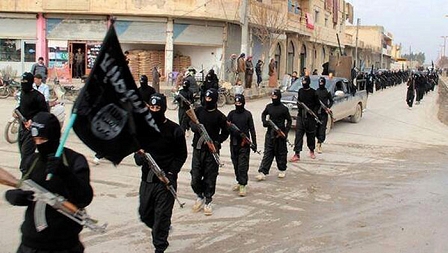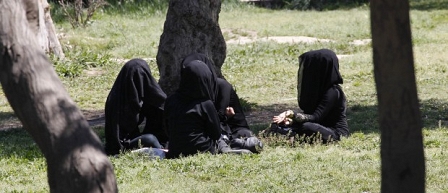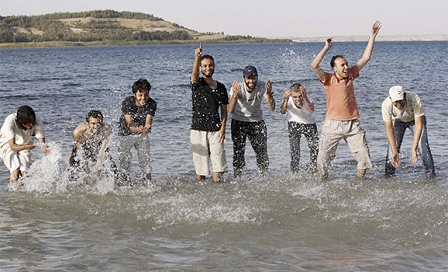Erstellt am: 3. 7. 2015 - 14:37 Uhr
"I will get your head!" - Life under Islamic State

unknown
Before the Syrian civil war, Raqqa was a historic, quiet city, enjoying a small but discerning tourist trade and offering a relaxed lifestyle for its over 200.000 residents.
Under the Assad regime, Syria was officially secular, and the constitution guaranteed religious freedom. Secular courts handled civil and criminal cases, but Muslims could opt to take personal, family or religious cases to a Sharia court, if they wished. Similarly, other religions could choose a secular or religious court for personal and family issues. Women could dress as they liked, although headscarves and other forms of Islamic dress were banned in government buildings.
With both secularists and Islamists in the anti-Assad movements, it's hard to know what the future will hold, but one thing is abundantly clear: The arrival of Daesh/Islamic State fighters has turned life on its head for Syrians in areas under their control.

Creative Commons
Raqqa was one of the first cities to fall to Islamic State militants, and it is still considered to be their "capital" in Syria. Syrians fled the city in their thousands, many heading north to Turkey, where they now live as refugees.
Our Istanbul correspondent, Adnan Kahn, travelled down to the border and told Steve Crilley what he found.
Dieses Element ist nicht mehr verfügbar
Here, Adnan met a young refugee from Raqqa who left the city about eight months ago. He told Adnan some remarkable stories of life under Islamic State, which he refers to under the Turkish name, ISHID. He wished to be anonymous for his own safety, so we are calling him A.Z.
His first story is how the arrival of Islamic State impacted on community, social and personal life, and in particular on the park that was a popular meeting place.
Shrouded in black, the all women look the same
A.Z.: "There is a park. Many people went there. The children played there, and [people] met each other there. When ISHID came to my town, the park died, because no one goes to the park [any more]."
"Actually ISHID now use the park for meetings. They bring a projector, and they bring people to see [films of] the ISHID wars. That’s the park now. Women cannot be alone in the park. The women [have to] be dressed in black and wear the Niqab. It’s hard for women to wear a niqab and to wear black, and they are not allowed to sit in the park alone."

Creative Commons
"Even if a husband and wife are sitting in that park, and ISHID soldiers come, I think they will make a problem.
After ISHID came, all the girls looked the same. I couldn’t [tell] my girlfriend [apart] from the other girls. After a week, I told my girlfriend to wear red shoes, and she wore red shoes – and the next day I could recognize her by her red shoes."
Dieses Element ist nicht mehr verfügbar
Ignore prayer time at your peril
Under Islamic State, prayers must be strictly observed, and everything stops at the appointed times. Ignoring the rules can have very serious consequences, and A.Z. recalls how he came within a stroke of his life when he was discovered skipping prayers, smoking and listening to music.

unknown
A.Z.: "One day I was in my workplace, and I closed my door because it was prayer time, and at the prayer time no-one should be on the streets. Actually, I was smoking and drinking an energy drink, and listening to some music. Music is not allowed, and my door was being knocked, and they asked me why I didn’t pray."
"I said, 'I have a problem with my legs, and I can’t pray.'
They said, 'That’s OK. Why are you smoking?'
I said, 'I cannot let go of these things'.
They said, 'It’s OK. It’s not a problem. I will get your head'.
I was scared. I looked at my friend, [thinking] 'Goodbye, I’m dead!'
And then one of the ISHID men said, 'I’ll work with you. That will [keep] you alive.'
I said, 'What kind of work?'
He said, 'I want [to get on] the Internet to do something, and you are the only one with high-speed Internet.'
unknown
"I said to him, 'My place belongs to you! You can sit down, you can sit in the manager’s [office], you can sit anywhere. You’re my friend – I know you from 2003! It’s destiny!'
He said , 'This is the first time, and I’m taking this as a joke. The next time, I will get your head.' "
Dieses Element ist nicht mehr verfügbar
Islamic State is watching
It's not only in the workplace that Islamic State are watching. A.Z. thought he could find some safety and freedom in the privacy of his own bathroom, but he was wrong.
A.Z.: "One day I was in my bathroom, in my home. I spent a lot of time in the bathroom, the bathroom being the thinking room and the safe room. In my bathroom I sing songs, I [smoke] and can be a teenager.
When I was smoking and singing songs, I heard someone bawling and saying, 'I will catch you! Don’t smoke! Don’t do anything! I hear you, I know you!'
I closed the bathroom [door] and stepped out of my house."

unknown
"One of the ISHID men came to me and said, 'I’m your neighbour. You were in your bathroom, in the shower. I saw you from my window. You were smoking in your bathroom'.
I said, 'OK, I’m not going to lie. I was smoking, and I was singing songs.'
He said to me, 'You are my neighbour and you are a good person. [But I will see that] these things will be punished.' "
Dieses Element ist nicht mehr verfügbar
The Islamic State neighbour meant what he said, and A.Z. ended up spending a night or two in prison, but eventually he was released.
His decision to leave was not taken lightly, but he knew that every day he stayed in Raqqa his life was at risk.
"Bye bye, my friend"
When A.Z. had taken the decision to leave, he went one more time to the place that he had enjoyed with his family and friends every day for so many years, the river.
A.Z.: "I miss that river, because in Raqqa every day, I go with my friends to that river, swimming, fishing and to have some fun. My father taught me to fish in that river. That river is like my family."

Creative Commons
"In the past we would go for a picnic by the river; girls and boys – it wasn’t a problem. There we were smoking, we had everything, we laughed, we were singing songs and dancing. We had freedom, because we knew there was no-one from ISHID there."
"Before I came here (to Turkey), I went to the river to say, 'Bye, bye, my friend!'"
Dieses Element ist nicht mehr verfügbar
The interview with A.Z. was conducted in Turkey, near the Syrian border, by Adnan Khan
FM4 Reality Check
Monday to Friday from 12.00 to 14.00, Saturday from 12.00 to 13.00, and after the show via Podcast or fm4.orf.at/realitycheck.


